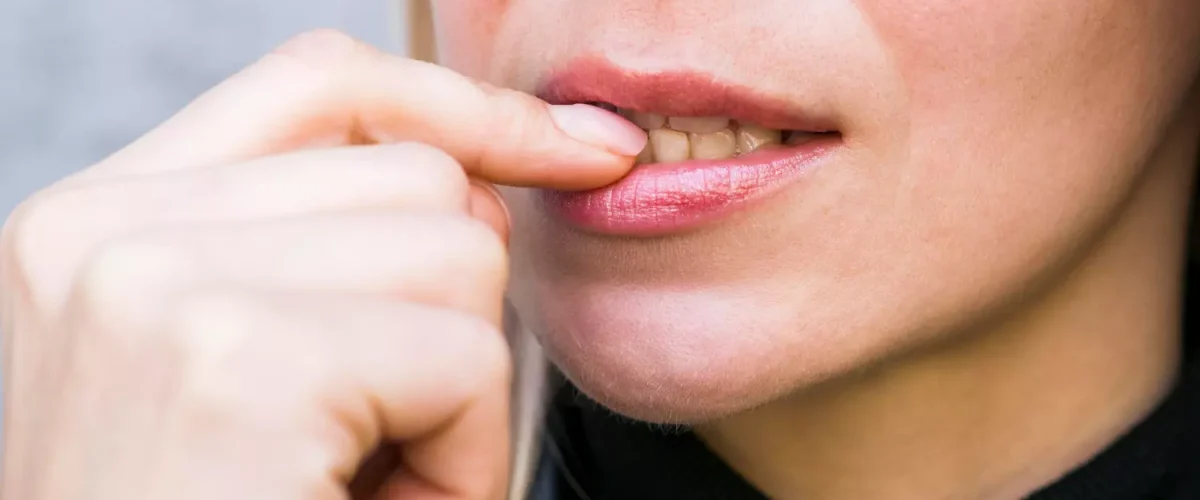Oral thrush, also known as oral candidiasis or muguet, is a common condition that can affect people of all ages. In this article, we will discuss the most common symptoms, the most effective treatments, and some home remedies that may provide relief.
Oral thrush: Symptoms
White lesions of oral thrush and white tongue
One of the hallmark oral thrush symptoms is the appearance of whitish patches adhering to the mucosa. When these colonies of Candida settle on the tongue, they form a distinct white tongue. These cottage-cheese–like spots resist gentle scraping and, if removed, leave a reddened or slightly bleeding surface.
Burning or itching sensation in mouth and on tongue
Alongside visible thrush in mouth, many patients report a persistent burning or itching feeling in the oral mucosa and on the tongue. This discomfort often worsens with acidic or very hot foods, making eating and drinking unpleasant.
Taste alterations from oral thrush
Infection by Candida can trigger taste disturbances—another key oral candidiasis symptom. Known as dysgeusia, this can make foods taste bitter, metallic, or simply “off,” which in turn can reduce appetite and enjoyment of meals.
Painful swallowing due to thrush in throat
If oral thrush spreads beyond the tongue into the pharynx, patients may experience painful swallowing. This sore-throat sensation can lead to avoidance of certain foods or liquids, risking dehydration and discomfort.
Redness and inflammation associated with oral thrush
Besides white patches, affected areas often show redness and inflammation. Both the mucosa and the tongue may become swollen and tender—clear warning signs that you should seek treatment for oral thrush promptly.
Oral thrush: Treatment
Oral antifungal medications
Prescription antifungal medications are a common treatment for oral thrush. They help eliminate the infection and restore the microbial balance in the mouth.
Antifungal mouth rinses
Some dentists recommend specific mouthwashes designed to combat oral thrush. These rinses contain antifungal agents that help reduce the infection.
Preventive measures
Maintaining good oral hygiene is essential for preventing and treating oral thrush. It is important to:
- Brush your teeth regularly.
- Use dental floss.
- Rinse your mouth with appropriate products.

Home remedies for oral thrush
Probiotic yogurt
Yogurt containing live cultures can help restore the balance of healthy bacteria in the mouth. Regular consumption may be beneficial in preventing and treating oral thrush.
Coconut oil
Coconut oil has natural antifungal properties. Rinsing your mouth with coconut oil may help reduce the number of fungi present in the oral cavity.
Baking soda
Gargling with a solution of baking soda and water can help relieve discomfort caused by oral thrush. Baking soda has alkaline properties that can counteract the acidity associated with oral candidiasis.
Conclusion
Oral thrush can be an uncomfortable condition, but with early detection and proper treatment, it can be managed effectively. If you experience any of these symptoms, consult your dentist for an accurate diagnosis and a personalized treatment plan.
If you suspect you may have oral thrush, visit our dental clinic in Fuengirola and let our specialists take care of you. We are here to help!
FAQ about oral thrush
What is oral thrush and what are its symptoms?
Oral thrush, medically known as oral candidiasis, is an infection caused by the excessive growth of the Candida albicans fungus. Common symptoms include white lesions on the tongue, gums, inner cheeks, or palate, a burning or itching sensation, changes in taste, pain when swallowing, and redness and inflammation in the affected areas.
What are the causes of oral candidiasis?
Oral candidiasis can be triggered by various factors. The most common causes include a weakened immune system, prolonged use of antibiotics or corticosteroids, poor oral hygiene, chronic conditions such as uncontrolled diabetes, and ill-fitting dentures. Additionally, factors such as smoking, malnutrition, or excessive use of alcohol-based mouthwashes can contribute to an imbalance of microorganisms in the mouth.
How is oral candidiasis treated?
Treatment usually includes antifungal medications, such as mouth rinses, lozenges, or gels that eliminate the fungus. Additionally, improving oral hygiene and addressing underlying causes, such as adjusting dentures or managing chronic conditions, is essential. In more severe cases, specialized medical attention may be required, especially if the candidiasis spreads or affects other areas of the body.
Is oral candidiasis contagious?
No, oral candidiasis is not considered highly contagious. Although the Candida albicans fungus can be transmitted from one person to another through close contact, such as kissing, this is rare because most people already have this fungus in their mouth as part of their natural flora. However, individuals with a weakened immune system or certain health conditions may be at a higher risk of developing an infection.
How can you prevent oral thrush?
Preventing oral thrush involves maintaining good oral hygiene: brushing your teeth at least twice a day, using dental floss, and properly cleaning dentures. Additionally, it is important to manage chronic conditions such as diabetes, avoid smoking, limit the unnecessary use of antibiotics, and opt for alcohol-free mouthwashes. Maintaining a balanced diet and visiting the dentist regularly are also essential for preventing oral health issues.

